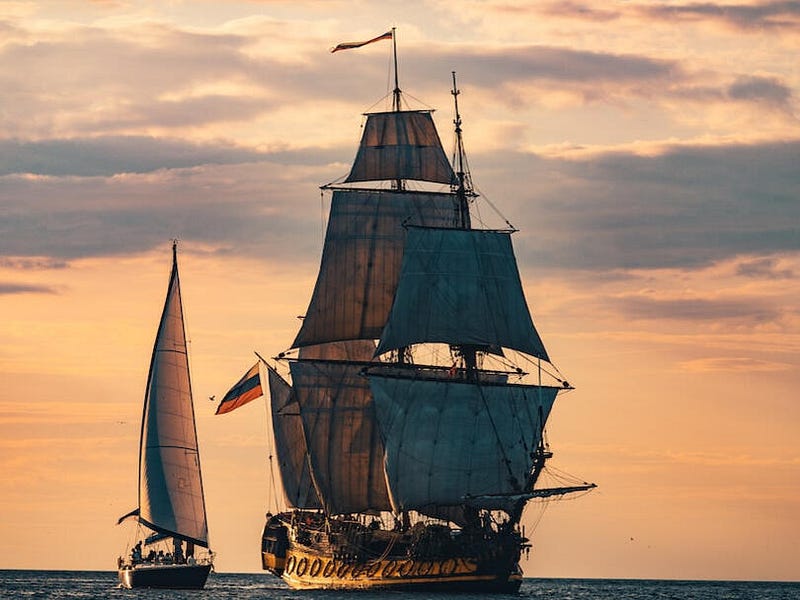The Unfortunate Math Behind Columbus's Historic Voyage
Written on
Chapter 1: Columbus's Miscalculations
It's astonishing to think that Columbus's poor math skills altered the course of history. Despite centuries of evidence regarding the Earth's dimensions, Columbus relied on his inaccurate calculations, and now we find ourselves honoring a historically detrimental figure.

While many regard Columbus as the heroic discoverer of the Americas, a deeper look into his understanding of geography reveals that he was merely a fortunate individual lacking in mathematical skills. His life can be likened to a miscalculated equation that somehow yielded the right result.
Ultimately, Columbus was a fool who got extraordinarily lucky, akin to a tipsy individual stumbling into the wrong restroom. His story raises questions about whether the universe is merely a grand cosmic prank.
Columbus disregarded centuries of geographical knowledge, mistakenly believing the Earth was much smaller than it actually is. Who needs historical scientific data when you can take a gamble, especially when it comes to exploring uncharted territories?
For centuries, the equatorial circumference of the Earth was known, with Eratosthenes, a Greek mathematician and astronomer from the 3rd century BC, estimating it to be around 39,375 kilometers (approximately 24,662 miles)—a remarkably close approximation, off by only about 700 kilometers (239 miles). The actual measurement is roughly 40,075 kilometers (24,901 miles).
How did this ancient mathematician achieve such precision without modern tools? By measuring the length of shadows in wells at different times of the day and understanding that at noon during the summer solstice in Syene (now Aswan), a vertical rod would cast no shadow.
Using this information and some geometry, Eratosthenes concluded that the Earth was round and calculated its circumference—an impressive feat for someone from over 2,000 years ago. Yet, Columbus likely dismissed it as "fake science."
Columbus, ignoring centuries of research, incorrectly estimated the Earth's circumference to be 30,577 kilometers (19,000 miles), a staggering miscalculation of nearly 11,000 kilometers (close to 6,000 miles).
On the flip side, one could argue that Columbus was a Machiavellian mastermind, perhaps manipulating the figures to persuade Queen Isabella to fund his westward expedition to reach the East.
Columbus's "discovery" of the Americas was made possible by the financial backing of Queen Isabella, who had accepted his proposal after multiple rejections from other European monarchs.
Why hadn't anyone attempted to travel west to reach the East before Columbus? In the 15th century, navigating from Europe to the East Indies involved a perilous circumnavigation of Africa—a long and treacherous journey. Many explorers sought a more straightforward route.
Every navigator of Columbus's era understood that the Earth was round and knew its approximate circumference. However, they couldn't have foreseen the existence of substantial landmasses blocking their path. They believed the journey would be over open oceans, making it impractical as supplies would run out long before reaching the East Indies.
Nevertheless, Columbus was determined to pursue this misguided venture, petitioning every significant monarchy in Europe, all of whom recognized the absurdity of his proposal and turned him down. In a last desperate move, he might have adjusted the numbers to sway the naive queen. Still, there is no definitive proof that he manipulated the figures; he simply believed the Earth's circumference was over 10,000 kilometers (6,000 miles) less than its actual size.
Thus, while Columbus may have been somewhat foolish, fortune favored him (to the detriment of the original inhabitants of the Americas). He fortuitously sailed in the right direction, landing in the Americas.
Had he chosen a different course, he might have been lost at sea, and the mutiny brewing on his ship could have led to him being thrown overboard.
With a naïve queen eager to enhance her legacy and misguided mathematics, Columbus's arrival in the Americas was not a reflection of his intelligence or navigational prowess, but rather a series of fortunate circumstances.
Despite his obvious mathematical shortcomings, he unwittingly found himself memorialized as a "hero." It's as if he relied on a compass made from rice and a map sketched by a pigeon, yet still managed to arrive at the correct destination.
Dumb luck played a more substantial role in Columbus's success than his own skills. Although he wasn't the first European to reach the Americas, he is credited with the discovery due to his superior public relations compared to the Vikings.
Chapter 2: Historical Perspectives on Columbus
This video titled "The Truth About Columbus - Knowing Better Refuted" by BadEmpanada examines the myths surrounding Columbus's journey and the implications of his actions.
The second video, "GED Math - How to Get the Right Answers on the 2024 Test (1)," provides insights into the importance of accurate calculations, reflecting on the broader implications of mathematics in history.